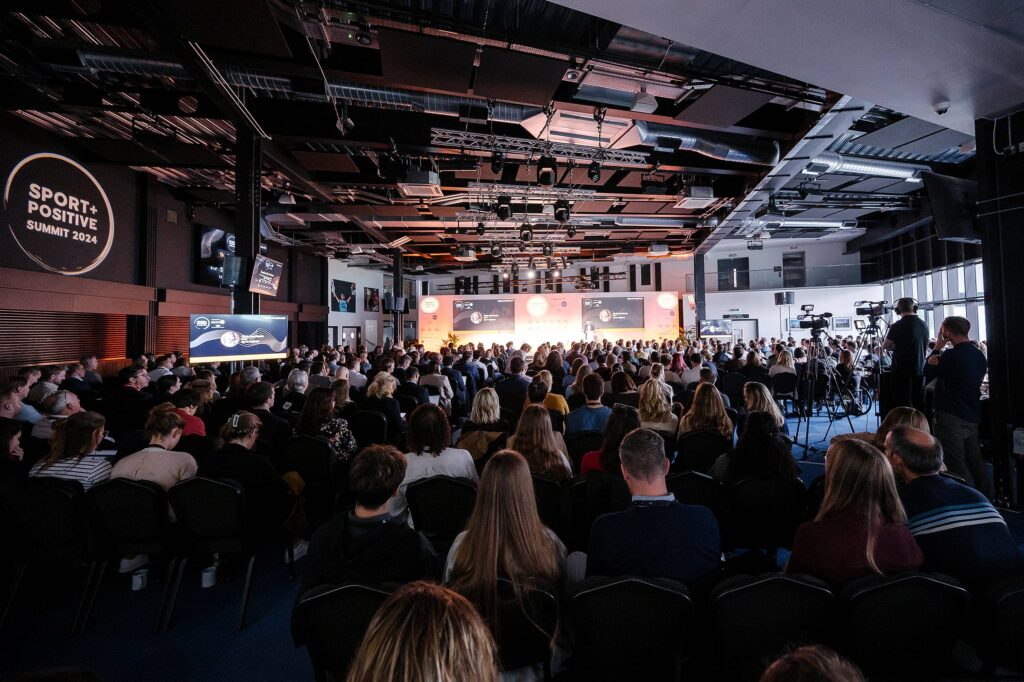
Products of Change: On the field at Sport Positive Summit 2024
Products of Change Ambassador for Sport, Simon Gresswell, is in attendance at the Sport Positive Summit this week at the Oval, London. The aim of the event is to bring together global decision-makers in sport to facilitate collective action on climate and sustainability.
The summit began with an opening address from Chris Boardman, the chair of Sport England, who set out the landscape in which the sporting world is currently operating. Some football clubs, such as Forest Green Rovers, Watford, Plymouth Argyle, and Lewes (which has made the switch to recycled shirts and a vegan food menu) have been making strides in terms of sustainability.
However, UEFA has increased the number of its games and competitions and in the Premier League, half of the clubs flew to the US for friendlies over the summer, amassing a significant environmental impact. Meanwhile, Southampton, West Ham, Aston Villa and Crystal Palace played lower league clubs instead, to reduce the impacts of further travel.
There needs to be a “synergy between player welfare and planet welfare,” said Chris Boardman in his address. Football clubs should be stepping up and encouraging greener transport, nurturing biodiversity at training grounds etc. There are three billion football fans worldwide, so “let’s lead,” said Boardman.
Next on the agenda was World Rugby’s approach to sustainability, with Mihir Warty, CSO, World Rugby. He explained that the Rugby World Cup is the third biggest sporting event, so sustainability matters. One third of global players are from the Pacific Islands, for whom the impacts of climate change are particularly pertinent. “Sports people and fans love winning; […] adopt and adapt to sustainability,” commented Warty.
A panel discussion ‘Fireside Chat on Resilience and the Athlete Voice’ posed the question: how can sport use influence, innovation and resilience? On the panel were Qasa Alom, presenter, journalist and director; Jasmin Paris MBE, ultrarunner and co-founder of Green Runners; and Imogen Grant, Olympic Gold Medallist rower and BBC Green Sport Awards Athlete of Year. Paris spoke about the three times she ran a previously men-only ultramarathon, the Barkley Marathons, a 100-mile course in Frozen Head State Park in Tennessee, which includes 16,500 metres of elevation, which is the equivalent to climbing Everest twice, and must be completed within a 60-hour time limit. Since 1989, over 1,000 runners have attempted the course, but only 20 have ever finished. The first two times Paris attempted the run, she did not finish, but on the third try she crossed the finish line with 99 seconds to spare. Paris said she considers the first two attempts as learnings not failures. The takeaway from the panel, was to dream big and not lose sight of the goal, especially for events, federations, and corporations.
In a ‘Lightning Q&A’ session, Michele Uva, UEFA director of social responsibility & sustainability, said that on 1st November, UEFA will launch its report into objectives, actions, and achievements in sustainability – for the 2024 Euros, €30 million was spent on sustainability, compared to €500k at the previous event. Following this, Annie Horn, NBA director of social responsibility & sustainability, explained NBA Green has already been around for 15 years, but this year brought in a consultant and moved to hone in on environmental sustainability. The panel discussed how sports can bring positive impact since fans may be more likely to listen to their sporting idols than politicians, and this influence should be used for good.
The idea that sport could be seen to be promoting unhealthy and harmful activities through its use of airlines and fossil fuels, was raised in a panel and attendees input session, such as was with smoking in the 1970s. We wouldn’t dream of advertising a tobacco company in a stadium now, so why not the same with airlines or fossil fuel companies? Attendees raised challenges to sustainability, such as the fear of greenwashing, poor travel alternatives to flying, and the lack of understanding.
In the final session of the day, titled ‘Behaviour Change Levers to Connect with Fans’, the panel’s moderator, Katie Cross, CEO of Pledgeball, explained how she began her grassroots football tournament with the caveat that each team has to make a pledge, encouraging potential change through simple actions. Professor Lorraine Whitmarsh MBE, Bath University, revealed that the average carbon footprint per person per annum in the UK us 8.5 tons, but we need to be at 2.5 tons. The simplest ways to cut this down, Whitmarsh said, are: 1. Live car free, 2. Drive an electric vehicle, 3. Take one less return long haul flight. Tom Harris, sustainability manager at Brighton & Hove Albion FC, spoke about how the Amex stadium, just outside Brighton, was built with sustainability in mind, with its own train station, two bus stops, and subsidised public transport for home and away fans in the local area, resulting in 75-80% of its fans using public transport.
Overall, many valuable conversations being had, with some fantastic examples of work already being done and shared for learnings across the industry.
Read Full Article